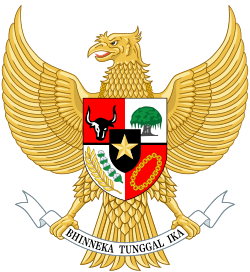Military Police Corps (Indonesia)
| Joint Service Military Police Command of the Indonesian National Armed Forces | |
|---|---|
|
Pusat Polisi Militer Tentara Nasional Indonesia | |
 | |
| Active | 4 May 2015 [1] |
| Country |
|
| Branch |
|
| Type | Military Police command |
| Role | Law enforcement within the Armed forces |
| Part of | the Central Executive Agencies of the TNI |
| Nickname(s) |
PM, Blue Berets (Baret biru) |
| Beret | Blue dragged to the left |
| Commanders | |
| Provost Marshal | Major General Dedy Iswanto |
| Deputy Provost Marshal | Flotilla Admiral Totok Budi Susanto |
.jpg)
The Puspom TNI (Indonesian: Pusat Polisi Militer Tentara Nasional Indonesia) or Joint Military Police Command of the Indonesian National Armed Forces (TNI) is one of the central executive agencies within the TNI which has the role of administering administrative assistance to the army, navy, and air force as embodiment and guidance through the operation of Military Police functions. Puspom TNI oversees the three military police organizations which are the Army Military Police, Naval Military Police, and Air Force Military Police.
The military police of Indonesia perform duties in the area of law enforcement (including investigation of crime) involving members of the military and may coordinate with other law enforcement agencies, such as the Indonesian National Police (Polri) and/or the Corruption Eradication Commission (KPK).[2]
The military police of Indonesia is not considered as a Gendarmerie, as it is only responsible solely to enforce discipline and law and order towards members of the armed forces of all ranks.
Highest position in the Military Police Corps is Provost Marshal of Military Police, a position held by a 2-star general/admiral/marshall from the military police corps of any of each service branch.
History
Prior to the 4th of May 2015, the military police units was only present within each of the armed forces branches (Army, Navy and Air force). At the TNI headquarters level, the special staff officer (which is held by the army military police commander) was appointed as the main aide and advisor to TNI commander (Panglima TNI) regarding military policing affairs.[3] On 4 May 2015, the commander of the Armed Forces Gen. Moeldoko reorganized the military police units of the three branches, he commanded the special staff officer to be formed as a Military Police Command (Puspom TNI) to improve law and order within all of the three branches within the armed forces. Since then, the Puspom TNI/INAF-JSMPC became the highest military police authority organization with the armed forces (TNI) overseeing the military police units of the three branches.[4][5][6][7]
Executive agencies under the supervision of the Puspom TNI
Each armed forces branch has its own executive agency regarding military policing affairs, which are as follows:
- Army Military Police Command (Pusat Polisi Militer TNI Angkatan Darat abbreviated Puspomad)
- Navy Military Police Command (Pusat Polisi Militer TNI Angkatan Laut abbreviated Puspomal)
- Air Force Military Police Command (Pusat Polisi Militer TNI Angkatan Udara abbreviated Puspomau)
The Puspom TNI as a centralized-command of the Military Police corps oversees the three military police branches (shown above) as a compound unit within the armed forces organization. The members in the Puspom TNI originates from the three military police corps.
See also
References
- ↑ "Polisi Militer TNI Resmi Dibentuk, Ini Kewenangannya". viva.co.id. 4 May 2015. Retrieved 3 March 2018.
- ↑ Ihsanuddin (8 November 2017). "POM TNI: KPK Berwenang Usut Kasus Helikopter AW 101". nasional.kompas.com. Retrieved 3 March 2018.
- ↑ Army Military Police Center (Puspomad) website; History
- ↑ "Tingkatkan disiplin personel, Jenderal Moeldoko dirikan POM TNI"
- ↑ "Tujuan Dibentuknya Pom Mabes TNI Demi Transparansi Kasus"
- ↑ "Panglima TNI Rombak Struktur Polisi Militer"
- ↑ "Panglima TNI Resmikan POM TNI"
